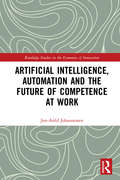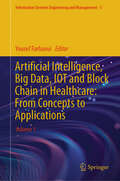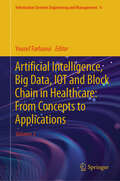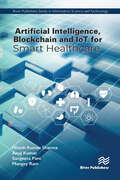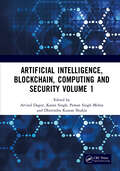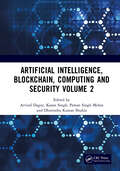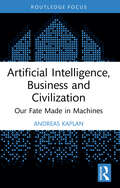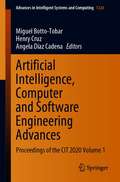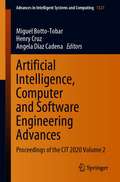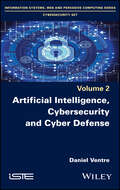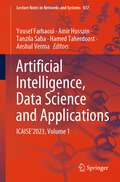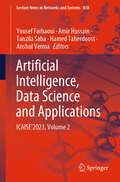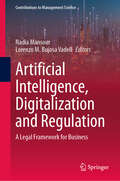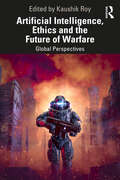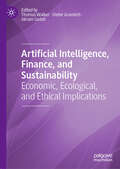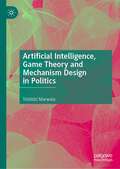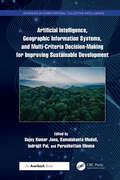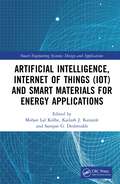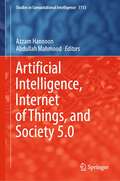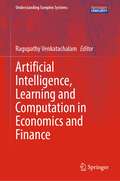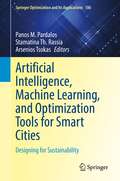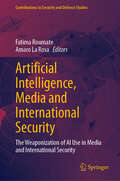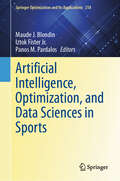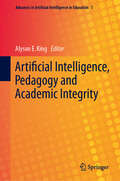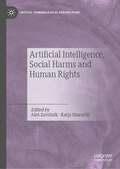- Table View
- List View
Artificial Intelligence, Automation and the Future of Competence at Work (Routledge Studies in the Economics of Innovation)
by Jon-Arild JohannessenArtificial intelligence and the autonomous robots of the Fourth Industrial Revolution will render certain jobs and competences obsolete but will also create new roles, which in turn require new sets of skills. They will also transform how we produce, distribute and consume, as well as how we think. Rather than a linear understanding of evolutionary processes, we will develop a more interactive and circular interpretation. This book offers a unique and holistic perspective on the future of work in the context of industry 4.0. It discusses the globalization of capital markets, how artificial intelligence can help organizations to be more competitive and the new role of leadership in this technological landscape. The author argues that there are four categories of competences, which will be required in order to maintain the relevance of human skills and expertise in the innovation economy. The new jobs that come into being will lend themselves to a particular set of skills. General competences will be necessary for roles involving the 4Cs of communication, creativity, collaboration and change. Specific or STEM competences will be called for across the science, technology, engineering and mathematics sectors. Human competences will lend themselves to positions comprising the SELC framework of social, emotional, leadership and cultural skills. Critical or REVE competences will be in demand for roles embracing reflection, ethics, values and the environment. The book provides a human-centric view of the current technological advancements of artificial intelligence and robotics and offers a positive outlook for human actors seeking continued relevance. It will appeal to scholars and students of the innovation economy, the knowledge society and the coming Fourth Industrial Revolution.
Artificial Intelligence, Big Data, IOT and Block Chain in Healthcare: Volume 1 (Information Systems Engineering and Management #5)
by Yousef FarhaouiThis book covers a wide range of topics related to the integration of Artificial Intelligence, Big Data, IoT, and Blockchain: From Concepts to Applications. It begins by establishing a solid foundation and introducing the concepts and principles of each technology. The subsequent chapters delve into the various applications and use cases, providing readers with real-world examples of how AI, IoT, and Blockchain can be leveraged to address key challenges in Smart Environments. Data is becoming an increasingly decisive resource in modern societies, economies, and governmental organizations. Data science, Artificial Intelligence, and Smart Environments inspire novel techniques and theories drawn from mathematics, statistics, information theory, computer science, and social science. This book reviews the state of the art of big data analysis, Artificial Intelligence, and Smart Environments. It includes issues that pertain to signal processing, probability models, machine learning, data mining, databases, data engineering, pattern recognition, visualization, predictive analytics, data warehousing, data compression, computer programming, smart city, etc. The papers in this book were the outcome of research conducted in this field of study. The latter makes use of applications and techniques related to data analysis in general and big data and smart cities in particular. The authors hope that this book serves as a valuable resource and guide for readers, empowering them to navigate the intricate landscape of Artificial Intelligence, IoT, and Blockchain in Smart Environments. Let the authors embark on this transformative journey together, as the authors explore the concepts and applications that hold the potential to shape the future of Smart Environments. The book appeals to advanced undergraduate and graduate students, post-doctoral researchers, lecturers, and industrial researchers, as well as anyone interested in big data analysis and Artificial Intelligence.
Artificial Intelligence, Big Data, IOT and Block Chain in Healthcare: Volume 2 (Information Systems Engineering and Management #6)
by Yousef FarhaouiThis book covers a wide range of topics related to the integration of Artificial Intelligence, Big Data, IoT, and Blockchain: From Concepts to Applications. It begins by establishing a solid foundation and introducing the concepts and principles of each technology. The subsequent chapters delve into the various applications and use cases, providing readers with real-world examples of how AI, IoT, and Blockchain can be leveraged to address key challenges in Smart Environments. Data is becoming an increasingly decisive resource in modern societies, economies, and governmental organizations. Data science, Artificial Intelligence, and Smart Environments inspire novel techniques and theories drawn from mathematics, statistics, information theory, computer science, and social science. This book reviews the state of the art of big data analysis, Artificial Intelligence, and Smart Environments. It includes issues that pertain to signal processing, probability models, machine learning, data mining, databases, data engineering, pattern recognition, visualization, predictive analytics, data warehousing, data compression, computer programming, smart city, etc. The papers in this book were the outcome of research conducted in this field of study. The latter makes use of applications and techniques related to data analysis in general and big data and smart cities in particular. The authors hope that this book serves as a valuable resource and guide for readers, empowering them to navigate the intricate landscape of Artificial Intelligence, IoT, and Blockchain in Smart Environments. Let the authors embark on this transformative journey together, as the authors explore the concepts and applications that hold the potential to shape the future of Smart Environments. The book appeals to advanced undergraduate and graduate students, post-doctoral researchers, lecturers, and industrial researchers, as well as anyone interested in big data analysis and Artificial Intelligence.
Artificial Intelligence, Blockchain and IoT for Smart Healthcare
by Mangey Ram Anuj Kumar Hitesh Kumar Sharma Sangeeta PantThe concepts of telemedicine and e-healthcare have eased as well as improved the reachability of experienced doctors and medical staff to remote patients. A patient who is living in a remote village area can directly connect to specialist doctors across the globe though his/her mobile phone using telemedicine systems and e-healthcare services. In pandemic situations like COVID-19, these online platforms helped society to get medical treatment from their residence without any physical movement. Technology is transforming human lives by playing an important role in the planning, designing, and development of intelligent systems for better service. This book presents a cross-disciplinary perspective on the concept of machine learning, blockchain and IoT by congregating cutting-edge research and insights. It also identifies and discusses various advanced technologies such as internet of things (IoT), big data analytics, machine learning, artificial intelligence, cyber security, cloud computing, sensors and so on that are vital to foster the development of smart healthcare and telemedicine systems by providing effective solutions to the medical challenges faced by humankind.
Artificial Intelligence, Blockchain, Computing and Security Volume 1: Proceedings of the International Conference on Artificial Intelligence, Blockchain, Computing and Security (ICABCS 2023), Gr. Noida, UP, India, 24 - 25 February 2023
by Karan Singh Pawan Singh Mehra Arvind Dagur Dhirendra Kumar ShuklaThis book contains the conference proceedings of ICABCS 2023, a non-profit conference with the objective to provide a platform that allows academicians, researchers, scholars and students from various institutions, universities and industries in India and abroad to exchange their research and innovative ideas in the field of Artificial Intelligence, Blockchain, Computing and Security. It explores the recent advancement in field of Artificial Intelligence, Blockchain, Communication and Security in this digital era for novice to profound knowledge about cutting edges in artificial intelligence, financial, secure transaction, monitoring, real time assistance and security for advanced stage learners/ researchers/ academicians. The key features of this book are: Broad knowledge and research trends in artificial intelligence and blockchain with security and their role in smart living assistance Depiction of system model and architecture for clear picture of AI in real life Discussion on the role of Artificial Intelligence and Blockchain in various real-life problems across sectors including banking, healthcare, navigation, communication, security Explanation of the challenges and opportunities in AI and Blockchain based healthcare, education, banking, and related industries This book will be of great interest to researchers, academicians, undergraduate students, postgraduate students, research scholars, industry professionals, technologists, and entrepreneurs.
Artificial Intelligence, Blockchain, Computing and Security Volume 2: Proceedings of the International Conference on Artificial Intelligence, Blockchain, Computing and Security (ICABCS 2023), Gr. Noida, UP, India, 24 - 25 February 2023
by Karan Singh Pawan Singh Mehra Arvind Dagur Dhirendra Kumar ShuklaThis book contains the conference proceedings of ICABCS 2023, a non-profit conference with the objective to provide a platform that allows academicians, researchers, scholars and students from various institutions, universities and industries in India and abroad to exchange their research and innovative ideas in the field of Artificial Intelligence, Blockchain, Computing and Security. It explores the recent advancement in field of Artificial Intelligence, Blockchain, Communication and Security in this digital era for novice to profound knowledge about cutting edges in artificial intelligence, financial, secure transaction, monitoring, real time assistance and security for advanced stage learners/ researchers/ academicians. The key features of this book are: Broad knowledge and research trends in artificial intelligence and blockchain with security and their role in smart living assistance Depiction of system model and architecture for clear picture of AI in real life Discussion on the role of Artificial Intelligence and Blockchain in various real-life problems across sectors including banking, healthcare, navigation, communication, security Explanation of the challenges and opportunities in AI and Blockchain based healthcare, education, banking, and related industries This book will be of great interest to researchers, academicians, undergraduate students, postgraduate students, research scholars, industry professionals, technologists, and entrepreneurs.
Artificial Intelligence, Business and Civilization: Our Fate Made in Machines (Routledge Focus on Business and Management)
by Andreas KaplanArtificial intelligence is shaking up economies around the world as well as society at large and is predicted to be either the best or worst thing to happen to humanity. This book looks at what exactly artificial intelligence is, how it can be classified, how it differentiates from other concepts such as machine learning, big data, blockchain, or the Internet-of-Things, and how it has evolved and might evolve over time. Providing a clear and unbiased picture of artificial intelligence, the book provides critical analyses of the advantages and disadvantages, opportunities and threats of AI progress for business and civilisation. Solutions and possible directions of how humanity might deal with rapid development and evolutions will be given and discussed, and consider regulation, employment, ethics, education and international cooperation. Unlike existing literature, this book provides a comprehensive overview of AI based on detailed analysis and insight. Finally, several real-life examples from various sectors and industries, including for profit organizations, higher education, and government, will substantiate and illustrate the presented concepts, classifications, and discussions. This book is of interest to researchers, educators, students, and practitioners alike who desire to understand AI in its broad lines and discover the latest research and studies within the field.
Artificial Intelligence, Computer and Software Engineering Advances: Proceedings of the CIT 2020 Volume 1 (Advances in Intelligent Systems and Computing #1326)
by Miguel Botto-Tobar Angela Díaz Cadena Henry CruzThis book constitutes the proceedings of the XV Multidisciplinary International Congress on Science and Technology (CIT 2020), held in Quito, Ecuador, on 26–30 October 2020, proudly organized by Universidad de las Fuerzas Armadas ESPE in collaboration with GDEON. CIT is an international event with a multidisciplinary approach that promotes the dissemination of advances in Science and Technology research through the presentation of keynote conferences. In CIT, theoretical, technical, or application works that are research products are presented to discuss and debate ideas, experiences, and challenges. Presenting high-quality, peer-reviewed papers, the book discusses the following topics:Artificial IntelligenceComputational ModelingData CommunicationsDefense EngineeringInnovation, Technology, and SocietyManaging Technology & Sustained Innovation, and Business DevelopmentModern Vehicle TechnologySecurity and CryptographySoftware Engineering
Artificial Intelligence, Computer and Software Engineering Advances: Proceedings of the CIT 2020 Volume 2 (Advances in Intelligent Systems and Computing #1327)
by Miguel Botto-Tobar Angela Díaz Cadena Henry CruzThis book constitutes the proceedings of the XV Multidisciplinary International Congress on Science and Technology (CIT 2020), held in Quito, Ecuador, on 26–30 October 2020, proudly organized by Universidad de las Fuerzas Armadas ESPE in collaboration with GDEON. CIT is an international event with a multidisciplinary approach that promotes the dissemination of advances in Science and Technology research through the presentation of keynote conferences. In CIT, theoretical, technical, or application works that are research products are presented to discuss and debate ideas, experiences, and challenges. Presenting high-quality, peer-reviewed papers, the book discusses the following topics:Artificial IntelligenceComputational ModelingData CommunicationsDefense EngineeringInnovation, Technology, and SocietyManaging Technology & Sustained Innovation, and Business DevelopmentModern Vehicle TechnologySecurity and CryptographySoftware Engineering
Artificial Intelligence, Cybersecurity and Cyber Defence
by Daniel VentreThe aim of the book is to analyse and understand the impacts of artificial intelligence in the fields of national security and defense; to identify the political, geopolitical, strategic issues of AI; to analyse its place in conflicts and cyberconflicts, and more generally in the various forms of violence; to explain the appropriation of artificial intelligence by military organizations, but also law enforcement agencies and the police; to discuss the questions that the development of artificial intelligence and its use raise in armies, police, intelligence agencies, at the tactical, operational and strategic levels.
Artificial Intelligence, Data Science and Applications: ICAISE’2023, Volume 1 (Lecture Notes in Networks and Systems #837)
by Amir Hussain Anshul Verma Yousef Farhaoui Tanzila Saba Hamed TaherdoostThis book is to provide a comprehensive reference for professionals in the field of data science and applications: artificial intelligence, big data, IoT, and blockchain. In summary, this book is expected to function as a helpful resource and manual, enabling readers to navigate the intricate domain of artificial intelligence, the Internet of things (IoT), and blockchain in smart environments. This book covers many topics related to integrating AI, IoT, blockchain, and smart environments. It begins by laying a solid foundation, introducing each technology's fundamental concepts and principles. Subsequent chapters explore applications and real-world use cases, demonstrating how AI, IoT, and blockchain can effectively address critical challenges within data science and applications.
Artificial Intelligence, Data Science and Applications: ICAISE’2023, Volume 2 (Lecture Notes in Networks and Systems #838)
by Amir Hussain Anshul Verma Yousef Farhaoui Tanzila Saba Hamed TaherdoostThis book is to provide a comprehensive reference for professionals in the field of data science and applications: artificial intelligence, big data, IoT, and blockchain. In summary, this book is expected to function as a helpful resource and manual, enabling readers to navigate the intricate domain of artificial intelligence, the Internet of things (IoT), and blockchain in smart environments. This book covers many topics related to integrating AI, IoT, blockchain, and smart environments. It begins by laying a solid foundation, introducing each technology's fundamental concepts and principles. Subsequent chapters explore applications and real-world use cases, demonstrating how AI, IoT, and blockchain can effectively address critical challenges within data science and applications.
Artificial Intelligence, Digitalization and Regulation: A Legal Framework for Business (Contributions to Management Science)
by Nadia Mansour Lorenzo M. Bujosa VadellThis edited volume explores the relationship between Artificial intelligence (AI), business performance, and regulation. Artificial intelligence allows entrepreneurs to create universally transferable platforms and customers to find the offer they want. Indeed, AI is an excellent tool for competitiveness and innovation. It can contribute to a positive business performance by reducing costs, analyzing and exploiting data, optimizing marketing strategy and advertising targeting, and improving the customer experience. However, Artificial intelligence can also generate threats such as disinformation, manipulation, and false content. Companies are increasingly becoming obliged to take security measures to protect digital data against cyber-attacks and data leaks. This volume presents concepts and solutions for companies aiming not only to benefit from the newest technological developments in AI but also interested in tackling the challenges that come with the use of these technologies.
Artificial Intelligence, Ethics and the Future of Warfare: Global Perspectives
by Kaushik RoyThis volume examines how the adoption of AI technologies is likely to impact strategic and operational planning, and the possible future tactical scenarios for conventional, unconventional, cyber, space and nuclear force structures. In addition to developments in the USA, Britain, Russia and China, the volume also explores how different Asian and European countries are actively integrating AI into their military readiness. It studies the effect of AI and related technologies in training regimens and command structures. The book also covers the ethical and legal aspects of AI augmented warfare.The volume will be of great interest to scholars, students and researchers of military and strategic studies, defence studies, artificial intelligence and ethics.
Artificial Intelligence, Finance, and Sustainability: Economic, Ecological, and Ethical Implications
by Thomas Walker Dieter Gramlich Akram SadatiAs the world increasingly recognizes the importance of sustainability, businesses and investors are looking for ways to integrate sustainable practices into their operations and investment decisions. At the same time, advancements in artificial intelligence (AI) and technology are transforming the finance industry and are enabling more data-driven decision-making. The intersection of these fields presents a significant opportunity to accelerate progress towards a more sustainable future, while also improving financial performance. This book explores the crucial role of AI in sustainability and finance, examining how financial technologies and machine learning are shaping the approach of finance professionals towards environmental, social, and governance (ESG) issues. It provides a comprehensive and integrated perspective on how these areas are becoming increasingly intertwined and examines the ethical and social implications of AI in finance and its potential to unlock new opportunities for sustainability. By focusing on the practical implications of these intersections and including both case studies and expert analysis, the book provides valuable insights for practitioners, policymakers, academics, and students alike.
Artificial Intelligence, Game Theory and Mechanism Design in Politics
by Tshilidzi MarwalaThis book explores how AI and mechanism design can provide a new framework for international politics. The international political system is all manners in which countries, governments and people relate. Mechanism design in international politics relates to identifying rules that define relationships between people and countries that achieve a particular outcome, e.g., peace or more trade or democracy or economic development. Artificial intelligence is technique of making machines intelligent. This book explores mechanism design and artificial intelligence in international politics and applies these technologies to politics, economy and society. This book will be of interest to scholars of international relations, politics, sustainable development, and artificial intelligence.
Artificial Intelligence, Geographic Information Systems, and Multi-Criteria Decision-Making for Improving Sustainable Development (Advances in Computational Collective Intelligence)
by Indrajit Pal Kamalakanta Muduli Purushottam Meena Sujoy Kumar JanaThe Asia-Pacific region, home to some of the world’s fastest-growing economies, faces a range of complex challenges, including environmental degradation, the increasing frequency of natural hazards, and rapid urbanization. Addressing these issues, which many countries across the globe are facing, requires innovative, interdisciplinary approaches to promote sustainable development and enhance resilience. Geographic information systems (GIS), when combined with multi-criteria decision-making (MCDM) techniques and advanced technologies such as artificial intelligence (AI), offer powerful tools to tackle these multifaceted problems. AIGIS integrates AI with GIS to derive insights from geospatial data. The fusion of AI techniques with GIS enhances data analysis, visualization, and decision-making. Artificial Intelligence, Geographic Information Systems, and Multi-Criteria Decision-Making for Improving Sustainable Development explore how these integrated tools can support decision-making processes aimed at advancing sustainable development.Drawing on research and insights from diverse disciplines, the book looks at how GIS, MCDM, and AI can provide solutions for disaster risk reduction, environmental monitoring, urban planning, and natural resource management. Through diverse case studies and theoretical explorations, this book highlights the value of integrated geospatial tools in facilitating informed decision-making and fostering resilient societies in the face of evolving challenges. It covers a wide range of topics, including the following: Site-soil-geology assessments in Fiji Flood risk analysis in Hong Kong Air quality management in Delhi during the COVID-19 pandemic Vegetation health monitoring in Thailand Bringing together the work of academicians, practitioners, and decision-makers, the book reflects the growing recognition towards effective and sustainable solutions to complex problems, which require a multidimensional approach, integrating scientific, economic, and social considerations. By providing the latest research and practical applications of MCDM, AI, and GIS, it contributes to ongoing efforts to build a more sustainable and resilient future for the Asia-Pacific region, as well as for the world.
Artificial Intelligence, Internet of Things (Smart Engineering Systems)
by Lal Kolhe MohanThis reference text offers the reader a comprehensive insight into recent research breakthroughs in blockchain, the Internet of Things (IoT), artificial intelligence and material structure and hybrid technologies in their integrated platform, while also emphasizing their sustainability aspects. The text begins by discussing recent advances in energy materials and energy conversion materials using machine learning, as well as recent advances in optoelectronic materials for solar energy applications. It covers important topics including advancements in electrolyte materials for solid oxide fuel cells, advancements in composite materials for Li-ion batteries, progression of materials for supercapacitor applications, and materials progression for thermochemical storage of low-temperature solar thermal energy systems. This book: Discusses advances in blockchain, the Internet of Things, artificial intelligence, material structure and hybrid technologies Covers intelligent techniques in materials progression for sensor development and energy material characterization using signal processing Examines the integration of phase change materials in construction for thermal energy regulation in new buildings Explores the current happenings in technology in conjunction with basic laws and mathematical models Connecting advances in engineering materials with the use of smart techniques including artificial intelligence, machine learning and Internet of Things (IoT) in a single volume, this text will be especially useful for graduate students, academic researchers and professionals in the fields of electrical engineering, electronics engineering, materials science, mechanical engineering and computer science.
Artificial Intelligence, Internet of Things, and Society 5.0 (Studies in Computational Intelligence #1113)
by Azzam Hannoon Abdullah MahmoodThis book unlike any other previous book provides a platform for scholars and researchers to present the latest insights and findings on the application of artificial intelligence and other sustainable technologies for a human-centric society. It brings together technology with society with special attention given to AI and IoT-related intricacies for a digital economy. It covers a variety of research topics including block ciphers, network marketing for sustainability entrepreneurship and AI, AI and stock trading decisions, digital transformation, knowledge management, chatbot engineering, cybersecurity, and smart metering system. The book is a comprehensive reference work for scholars, academics, policymakers, students, and professionals presenting an overall understanding of AI, its present and future trends, and presents a discourse on important policies and strategies on inclusivity, diversity, bias, accountability, security, metaverse applications of AI, and other technologies such as IoT.
Artificial Intelligence, Learning and Computation in Economics and Finance (Understanding Complex Systems)
by Ragupathy VenkatachalamThis book presents frontier research on the use of computational methods to model complex interactions in economics and finance. Artificial Intelligence, Machine Learning and simulations offer effective means of analyzing and learning from large as well as new types of data. These computational tools have permeated various subfields of economics, finance, and also across different schools of economic thought. Through 16 chapters written by pioneers in economics, finance, computer science, psychology, complexity and statistics/econometrics, the book introduces their original research and presents the findings they have yielded.Theoretical and empirical studies featured in this book draw on a variety of approaches such as agent-based modeling, numerical simulations, computable economics, as well as employing tools from artificial intelligence and machine learning algorithms. The use of computational approaches to perform counterfactual thought experiments are also introduced, which help transcend the limits posed by traditional mathematical and statistical tools.The book also includes discussions on methodology, epistemology, history and issues concerning prediction, validation, and inference, all of which have become pertinent with the increasing use of computational approaches in economic analysis.
Artificial Intelligence, Machine Learning, and Optimization Tools for Smart Cities: Designing for Sustainability (Springer Optimization and Its Applications #186)
by Panos M. Pardalos Stamatina Th. Rassia Arsenios TsokasThis volume offers a wealth of interdisciplinary approaches to artificial intelligence, machine learning and optimization tools, which contribute to the optimization of urban features towards forming smart, sustainable, and livable future cities.Special features include:New research on the design of city elements and smart systems with respect to new technologies and scientific thinkingDiscussions on the theoretical background that lead to smart cities for the futureNew technologies and principles of research that can promote ideas of artificial intelligence and machine learning in optimized urban environmentsThe book engages students and researchers in the subjects of artificial intelligence, machine learning, and optimization tools in smart sustainable cities as eminent international experts contribute their research results and thinking in its chapters. Overall, its audience can benefit from a variety of disciplines including, architecture, engineering, physics, mathematics, computer science, and related fields.
Artificial Intelligence, Media and International Security: The Weaponization of AI Use in Media and International Security (Contributions to Security and Defence Studies)
by Fatima Roumate Amaro La RosaThis edited volume explores the complex relationship between AI, media and international security, focusing on key criteria. First, identifying AI applications like automated content and deepfakes. Second, evaluating security risks, including AI-driven information and psychological warfare, while considering geopolitical factors in a shifting global landscape. Written by a collection of international experts across diverse disciplines and regions in the world, the chapters take a multidimensional perspective to provide a holistic understanding of the various implications of the use of AI in media. This volume contributes to research on AI's intersection with media and international security, examining AI's implications, challenges, and malicious uses. It also explores media diplomacy's role in navigating shifts in global power dynamics. Bridging political science, international relations, security studies, journalism, and communications, this book will benefit researchers and students across these fields.
Artificial Intelligence, Optimization, and Data Sciences in Sports (Springer Optimization and Its Applications #218)
by Panos M. Pardalos Iztok Fister Jr. Maude J. BlondinThis book delves into the dynamic intersection of data science, data mining, machine learning, and optimization within sports. It compiles and presents the latest achievements in this vibrant and emerging research area, offering a comprehensive overview of how these technologies revolutionize sports analytics and performance. Topical coverage includes artificial intelligence in sports, automated machine learning for training sessions, computational social science, and deep learning applications. Readers will also explore cutting-edge concepts such as digital twins in sports and sports prediction through data analysis. This volume highlights theoretical advancements and practical case studies that demonstrate real-world applications. Ideal for researchers, practitioners, and students in fields related to sports science, data analytics, and machine learning, this book serves as a crucial resource for anyone looking to understand the transformative impact of technology on sports. Whether you are an academic scholar or a professional working in the industry, this collection offers valuable insights that bridge the gap between research and practical solutions.
Artificial Intelligence, Pedagogy and Academic Integrity (Advances in Artificial Intelligence in Education #1)
by Alyson E. KingThis book addresses the implications of artificial intelligence for teaching, learning and academic integrity in higher education. It explores policies about the use of Generative Artificial Intelligence (GenAI), describes how to teach writing in the era of GenAI, and how instructors can design courses and assessments that prevent plagiarism while building the necessary skills for critical thinking and writing. Together, the chapters include research results, case studies, teaching methodologies, course design ideas, analysis of power and gatekeeping, and best practices related to GAI from a diverse range of researchers from English and French Canada, the United States, England, Ukraine and Croatia. The authors approach the advent and rapid spread of GenAI in higher education by examining its use from different perspectives with a particular focus on its impact on academic integrity. Taking a communication studies approach, consideration is given to the role GenAI might play disrupting power structures in universities to improve access for students who are non-traditional or English Language Learners. The book also explores how reimagining teaching methodologies can help to mitigate academic integrity violations due to misuse of GenAI and to teach students to use GenAI with integrity as a research and brainstorming tool. Students need to learn how to assess the reliability of GenAI&’s output as the develop the skills for research and writing. Methods of teaching writing and research skills using GenAI are explored in an effort to ensure that critical thinking skills are developed successfully. Most instructors who use writing-intensive assessments believe that essential critical thinking skills are developed via the writing process; often, ideas become concrete as one writes about them. Teaching with GenAI can provide opportunities for instructors to guide their students into a deeper analysis and critique of their research.
Artificial Intelligence, Social Harms and Human Rights (Critical Criminological Perspectives)
by Aleš Završnik Katja SimončičThis book critically explores how and to what extent artificial intelligence (AI) can infringe human rights and/or lead to socially harmful consequences and how to avoid these. The European Union has outlined how it will use big data, machine learning, and AI to tackle a number of inherently social problems, including poverty, climate change, social inequality and criminality. The contributors of this book argue that the developments in AI must take place in an appropriate legal and ethical framework and they make recommendations to ensure that harm and human rights violations are avoided. The book is split into two parts: the first addresses human rights violations and harms that may occur in relation to AI in different domains (e.g. border control, surveillance, facial recognition) and the second part offers recommendations to address these issues. It draws on interdisciplinary research and speaks to policy-makers and criminologists, sociologists, scholars in STS studies, security studies scholars and legal scholars.
